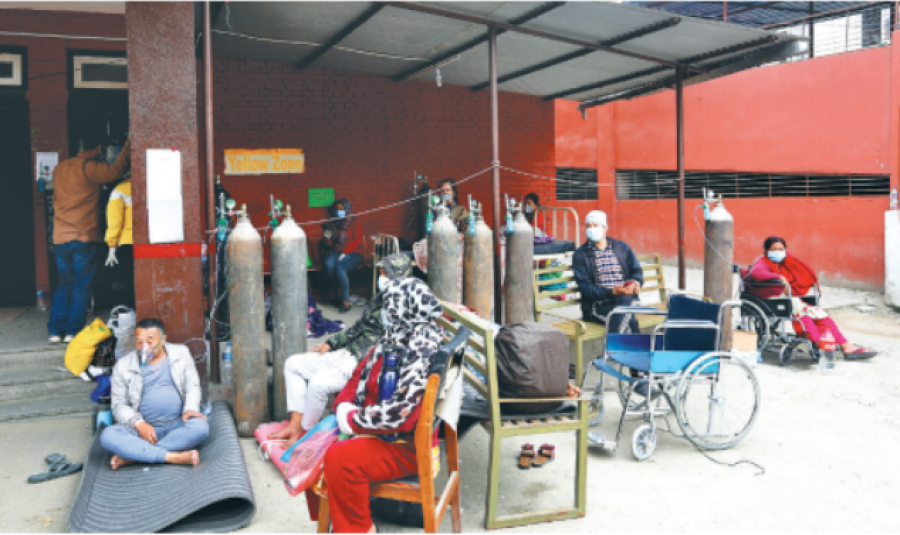Health
Nepal reports more Covid-19 deaths and record daily new infections
An independent research shows the Indian double mutant variant, which a WHO scientist says is more resistant to vaccines, in some samples in the Valley.
Arjun Poudel
On Monday, Nepal reported 139 deaths from Covid-19. The country also reported the highest single-day new cases. Out of 17,623 polymerase chain reaction tests, 9,127 cases tested positive, meaning around 52 out of every hundred tests returned positive, another record.
The death toll has reached 3,859. So far, the total number of cases reached 403,794 with 93,141 of them active.
The daily infection count has been more than 8,000 for the past several days compared to the high of 5,743 on October 21. The daily death toll had been more than 5o, before Monday, compared to a high of 30 on November 4 during the first wave.
Some independent researchers say the highly infectious, and possibly more lethal, sub-lineage of double mutant variant of the coronavirus, known as B.1.617.2, could be the reason for the fast spread of the disease.
According to a report on whole-genome sequencing, carried out recently in a private laboratory in Kathmandu, the B.1.617.2 was found in 75 percent of swab samples of the infected people.
“Of the 12 swab samples of the infected people collected randomly from Lalitpur, B.1.617.2 was found in swab samples of nine people,” Dibesh Karmacharya, executive director at the Center for Molecular Dynamics-Nepal, told the Post. “This B.1.617.2 appears to be spreading more quickly than two other identified subtypes of the Indian variant.”
Whole-genome sequencing is a comprehensive method of analysing the entire DNA sequences of an organism’s genes and is the scientific method to track the severity and properties of the virus.
Experts for some time have been raising concerns if the Indian double mutant was responsible for the fast spread of the virus in Nepal, which shares a long porous border with India.
Earlier in October last year, experts had raised alarm bells, saying the UK variant, known as B.1.1.7, was circulating in Nepal.
Karmacharya of the Center for Molecular Dynamics-Nepal said that their lab conducted the study at the request of the Lalitpur Metropolitan City
“There is evidence that this variant may evade antibody actions, possibly rendering vaccines ineffective against it,” Karmacharya told the Post.
Government officials, however, have not said yet if the double mutant variant is responsible for the rapid surge in coronavirus cases in the country.
Officials from the Epidemiology and Disease Control Division and the Health Ministry were not available for comments.
The World Health Organisation’s chief scientist Soumya Swaminathan, in an interview with the AFP news agency, said on Saturday that the B.1.617.2 variant may be dodging vaccine protections.
"The epidemiological features that we see in India today do indicate that it's an extremely rapidly spreading variant,” the AFP quoted Swaminathan as saying.
India has been seeing an uncontrolled spread of the pandemic which has led to hospitals running out of beds and the country running out of oxygen and other equipment in recent weeks.
On Monday it reported more than 350,000 infections after four days of more than 400,000 daily infections. Death toll has been hovering around the 4,000 mark per day.
Public Health England has already classified B.1.617.2, as a variant of concern from the earlier classification of “variant of interest” with evidence of rapid transmissibility in India, the UK and elsewhere.
“B 1.617 is likely to be a variant of concern because it has some mutations which increase transmission, and which also potentially could make [it] resistant to antibodies that are generated by vaccination or by natural infection," Swaminathan told the AFP.
Health authorities of several countries have said that they consider the double mutant B.1.6 17.2 a variant of concern.
“The current surge in Nepal's cases may point to this as the reason,” said Karmacharya. “While there has been much talk about whether the UK variant or the Indian variant is circulating in Nepal, we investigated and generated this evidence that it is the super-dominant Indian variant [B.1.617.2] which is currently circulating in Nepal,”
He, however, concedes that more quantitative data remains to be obtained as the sample size was small.
Authorities in Nepal are not aware of the types of virus variants circulating in the country. The Ministry of Health and Population believes that the fast spreading UK variant, known as B.1.1.7, is responsible for the current spike in new cases.
The government itself has not carried out whole-genome sequencing of the virus to study the variant circulating in the country of late despite the rapid spread of the infection for the last several weeks.
The Health Ministry in April said that the fast spreading UK variant of the coronavirus, first detected in January among people returning from the UK, was responsible for the current spike in new cases.
The ministry had sent swab samples of some people to the World Health Organization’s collaborating centre in Hong Kong for whole genome sequencing, which showed that the UK variant of the virus was dominant in a majority of cases.
On Monday, 910 Covid-19 patients were being treated in intensive care units and 295 critical patients were on ventilator support, according to government data.
Dr Sher Bahadur Pun, chief of the Clinical Research Unit at Sukraraj Tropical and Infectious Hospital, said authorities should take measures to contain the spread if the highly virulent and deadly variant has been circulating in the country.
“If the sub-lineage of the double mutant variant of the virus is found dominant in Nepal, it could spell disaster in the coming days,'' Pun, who is also a virologist, told the Post. “What is happening in India is already happening in Nepal.”




 11.12°C Kathmandu
11.12°C Kathmandu















